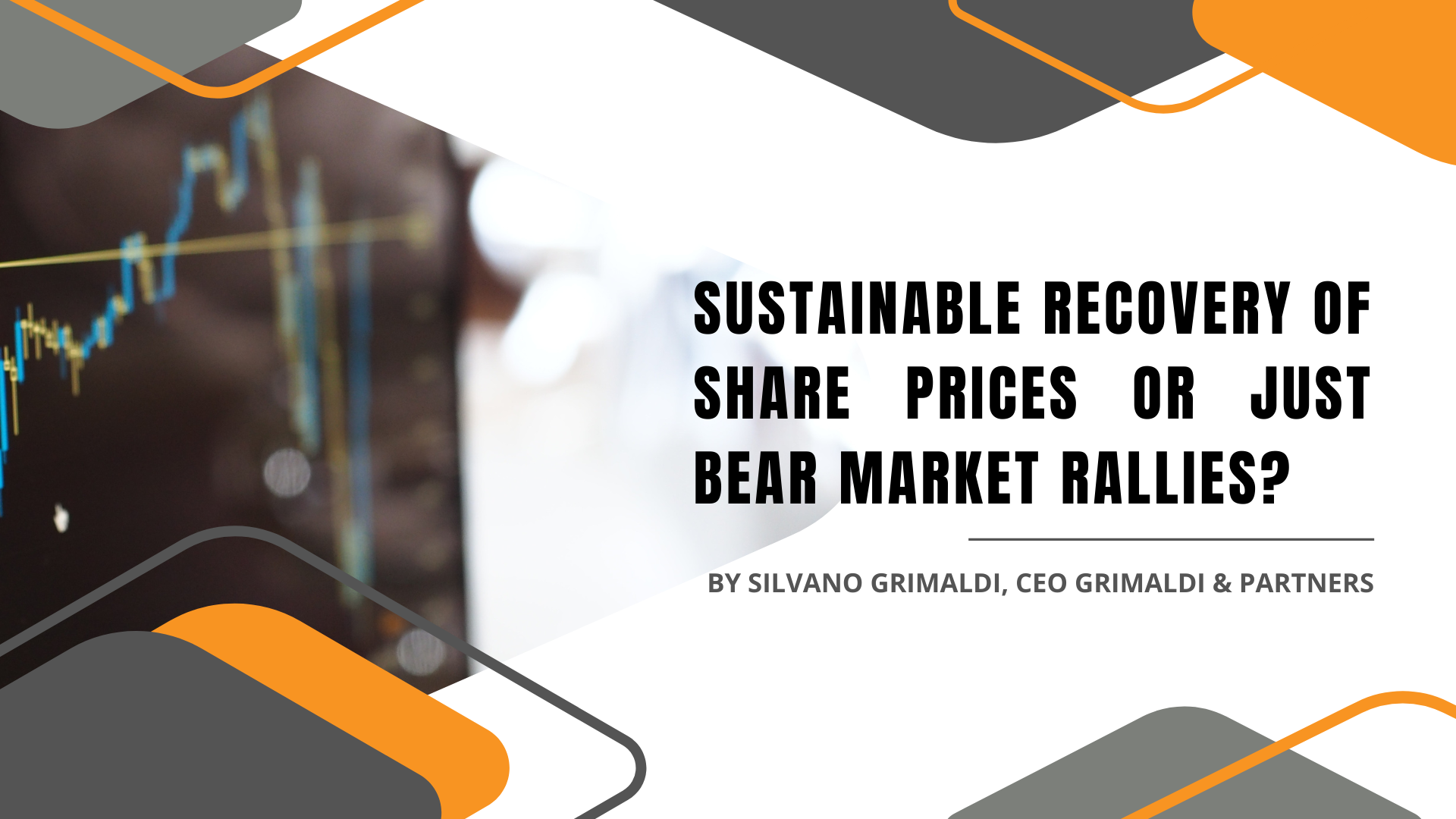Grimaldi & Partners: Sustainable recovery of share prices or just bear market rallies?
By Silvano Grimaldi , CEO Grimaldi & Partners
Zurich – Last March's stock market rebound, like this summer's, both turned out to be pure bear market rallies. Recently, the stock markets have been in a frenzy over September's fall in US consumer prices. Is this the beginning of a sustainable recovery? Should investors now buy more shares? Silvano Grimaldi, CEO of the independent asset management company Grimaldi & Partners AG, gives you the answers to these and other questions.
Reasons for the previous stock market recovery
In the first half of 2022, the stock markets were characterized by massive price declines. However, prices recovered at the start of the second half of the year. Unsurprisingly, low valuations, high cash holdings and the further increase in share buybacks compared to the previous year – not only in the USA but also in Europe – at least caused the bear market to be interrupted. Asset and fund managers who were forced to take action due to price increases then had to try to correct performance setbacks by increasing the share quota again. The recent fall in inflation rates in the USA gave the summer rally an additional boost.
Rise in inflation and economic growth slowed down in the USA
The peak in the US key interest rate should soon be reached, otherwise there is a risk that the economic weakness will continue and intensify. At the moment there are no sure signs – the inverse interest rate structure is not a reliable indicator either – of an actual recession. Private consumption has not collapsed and employment is still increasing. The US should have a soft landing this year. Although inflation continues to rob consumers of purchasing power and has a significant impact on private construction, the GDP growth rate for 2022 will be around one percent and thus lower than the estimated GDP growth rate of around 2.5 percent in the euro zone.
Monetary policy tightening also necessary in Europe
Due to a practically global economic downturn, many raw material and individual energy source prices (eg crude oil, various metals) are currently stagnating or even falling. But even if there are signs that inflation rates in some of the world's economies (eg in the USA and Switzerland) may already have peaked, it is not to be expected that the tightening of monetary policy will end anytime soon.
Producer prices, which lead consumer prices, will continue to rise throughout the euro zone. A sure indication of this is, for example, the massive increase in electricity prices in Germany and other European countries. Even in the USA, inflation is likely to remain high for the time being, despite declining inflation rates. In the euro area in particular, however, inflation will remain an acute and serious problem for some time to come, as the weak euro is amplifying the effects of imported inflation.
Bonds or Stocks?
As long as inflation rates are not on the way to the inflation targets set by the central banks, the uncertainties on the interest markets will persist, market interest rates will remain volatile and investors will be cautious about buying bonds.
Bonds with a risk-return profile comparable to equities are currently hard to find. In contrast to bonds, stocks can protect against the consequences of inflation to a certain extent (protection against inflation). In addition, the investor receives a risk premium with the purchase of shares.
Investors should therefore prefer shares in companies that, even if the economy slows down, still have distribution reserves even if inflation continues for a long time due to their pricing power - a key factor for earnings development. Such quality stocks can be found in all sectors.
Ultimately, the “ Total Shareholder Return (TSR)” – price change since the purchase of a share and the dividends received in the period under review – is a key indicator for long-term investment success.
However, not only large companies have pricing power. Among the small and mid-caps in Switzerland, there are quite a few globally active, medium-sized and often owner-managed companies ( hidden champions ) that, thanks to their convincing business models, remain extremely profitable even in phases of macroeconomic weakness and persistent inflation.
Conclusion: The current situation on the stock markets is likely to remain volatile.
The start of a sustained recovery in stock prices is by no means guaranteed at present. Further pullbacks in share prices and the end of the current bear market rallies can not be completely ruled out. The uncertainties in relation to interest rate developments and economic trends are too great . Even if no new geopolitical risks emerge, a single piece of negative information is enough to affect investor sentiment and temporarily halt the recovery trend in stock markets. Investors with a long-term perspective should not be put off by this and use the favorable valuation of numerous quality stocks to buy. Whenever possible, investors should choose to invest in stocks with a high TSR.
© 2022, Grimaldi & Partners Ltd.
GRIMALDI & PARTNERS Vermögensverwaltung is a renowned independent Swiss asset manager domiciled in the city of Zurich. The main bearers Silvano Grimaldi, lic.oec. HSG and Dr. iur. Reto A. Lyk are distinguished former bankers with an excellent reputation and more than 25 years of professional experience in asset management in the Zurich financial center. The top-class management team ensures flawless management of the business for the benefit of the customers. Grimaldi & Partners stands for independent, neutral, transparent, cost-conscious, performance-oriented asset management with better asset protection.
GRIMALDI & PARTNERS AG
Rautistrasse 33
8047 Zurich
Phone: 044 520 00 10
Email: info@grimaldi-partners.ch






